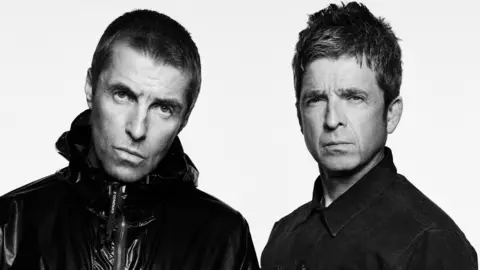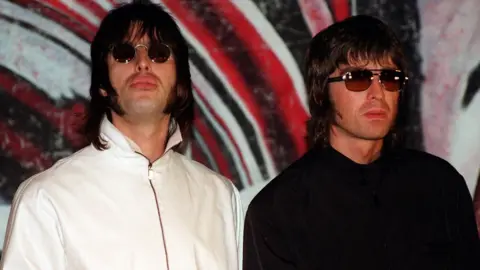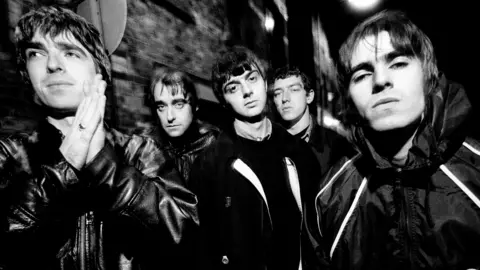Oasis new dates and everything you need to know about the reunion
 Simon Emmett
Simon EmmettOasis have announced two further live shows at Wembley Stadium - and there will be a different process for fans to get tickets following complaints over the weekend.
A row erupted on Saturday about so-called "dynamic pricing", where some tickets for the band's initial run of shows rose to more than £350 on Ticketmaster - up from the advertised £135 - due to demand.
For the two new dates, the band have said that "tickets will be sold by a staggered, invitation-only ballot process".
"Applications to join the ballot will be opened first to the many UK fans who were unsuccessful in the initial on sale with Ticketmaster," they added.
Here's everything else we know so far about tickets and the rest of the tour.
Where and when are Oasis playing?
So far, only UK and Ireland dates for Oasis' world tour have been announced.
They will play five dates at Manchester's Heaton Park, and seven dates at London's Wembley Stadium - two more than the previously announced five.
They'll also play three nights at Edinburgh's Murrayfield Stadium, and two at Cardiff's Principality Stadium.
The last gigs will be in Ireland, at Dublin's Croke Park. The dates are:
- 4, 5 July - Cardiff, Principality Stadium
- 11, 12, 16, 19, 20 July - Manchester, Heaton Park
- 25, 26, 30 July and 2, 3 August and 27, 28 September - London, Wembley Stadium
- 8, 9, 12 August - Edinburgh, Murrayfield Stadium
- 16, 17 August - Dublin, Croke Park
The band said these dates would be their only dates in Europe next year.
Oasis Live '25 has been described as a "world tour", suggesting global dates will be announced soon.
What are the new Oasis dates?
The band said the two new Wembley Stadium show had been scheduled due to "phenomenal demand".
These will be on 27 and 28 September 2025. Ticketing will be different, too - with the band's statement saying that "tickets will be sold by a staggered, invitation-only ballot process".
"Applications to join the ballot will be opened first to the many UK fans who were unsuccessful in the initial on sale with Ticketmaster," they added.
Some fans were left angry by the ticket-buying process over the weekend which left many fans empty-handed, and others paying significantly more than they expected.
However, next summer's 17 dates in the UK and Ireland still sold out in a matter of hours.
BBC News has asked representatives for the band if dynamic pricing will be used in the event that any remaining tickets are made available on Ticketmaster following the ballot.
How much do tickets cost?
 PA Media
PA MediaBefore Saturday's general sale, fans were told standard standing tickets would cost about £150 and standard seated tickets would range from £73 to about £205 (except in Manchester, which is all standing).
In addition, there were premium packages for both standing and seats ranging from £216 to £506.25, including merchandise items and access to a pre-show party and private Oasis exhibition, depending on the ticket level and venue.
Those were face value prices - but this hasn't been what some fans have been paying.
Some fans who got through to the Ticketmaster checkout on Saturday were surprised to find the prices had shot up to £350.
What is dynamic pricing?
Ticketmaster defines dynamic pricing as being where the sale price of tickets "may increase or decrease at any time, based on demand".
"This is similar to how airline tickets and hotel rooms are sold," it says.
But the company has said it does not set prices and that it is down to the "event organiser" who "has priced these tickets according to their market value".
It's not a new phenomenon and is allowed under consumer protection laws.
On 5 September, the UK competition regulator launched an investigation into the sale of Oasis tickets, including the use of "dynamic pricing".
While dynamic pricing is not illegal, the Competition and Markets Authority is investigating whether Ticketmaster breached consumer protection law.
The government also said it will include the controversial practice in a consultation into ticket resale websites, which had already been announced.
Culture Secretary Lisa Nandy said she wants to end "rip-off resales" and ensure tickets are sold "at fair prices".
Ticket resale sites are also selling tickets at a vastly increased value, with some being listed within minutes of Friday's presale.
Can I still buy tickets?
For fans who missed out, they can try to buy tickets for the two extra dates at Wembley Stadium. The band say "more details [are] to follow" about how to access them, but that fans who were unsuccessful first time around would be prioritised.
The official outlets for Saturday's sale was Ticketmaster, Gigsandtours and SeeTickets - and all those tickets sold out.
However, people who have bought them can put them back up for sale. In that circumstance, the band have urged fans to buy and sell using Twickets or Ticketmaster’s Fan-to-Fan service.
The terms and conditions say reselling a ticket through different platforms will breach the T&Cs, and may result in the ticket being cancelled.
One other thing that will still probably happen is scammers on social media taking advantage of the high demand. Consumer group Which? says: "Buying tickets from strangers on social media can leave you open to being scammed. In particular, you should watch out for newly set-up profiles that follow no one or have no followers."
Which? also advises against paying people by bank transfer, which is often the preferred method of fraudsters. "If you do choose to buy tickets from an individual seller, try to pay using a credit card so you’re protected by Section 75. Alternatively, PayPal has its own Buyer Protection system."
Will Oasis headline Glastonbury?
Ahead of Tuesday's reunion announcement, rumours swirled that Oasis could headline Glastonbury's Pyramid Stage for a third time as part of their return next summer, having previously done so in 1995 and 2004.
But the band have explicitly ruled out any festival appearances next year, Glasto included.
"Despite media speculation, Oasis will not be playing Glastonbury 2025 or any other festivals next year," they said in a statement posted on X.
"The only way to see the band perform live will be on their Oasis Live '25 World Tour."
 Getty Images
Getty ImagesWho else is in the band?
Oasis were formed in Manchester in 1991 - their original line-up comprised of Liam and Noel, guitarist Paul "Bonehead" Arthurs, bassist Paul "Guigsy" McGuigan and drummer Tony McCarroll.
But the line-up changed over the years (scroll down for more detail), before their last performance at V Festival in 2009.
Bonehead and Liam have remained friends, and the guitarist has joined Liam at some of his shows.
Currently, it isn't entirely clear exactly who fans will be seeing perform on tour, beyond the Gallagher brothers. BBC News has asked the promoter for clarification.
Why did they break up?
The band officially split in 2009 after an altercation backstage at the Rock en Seine festival in Paris.
Noel explained two years later that during an argument, Liam had tried to attack him with his guitar.
He claimed the row had started after he blocked Liam from advertising his clothing brand in the programme for V Festival, at which the pair were due to perform.
Liam said in 2017 he had felt unfairly scapegoated by Noel and left to shoulder the blame for the band's split.
But problems had been brewing before the festival incident - with the pair struggling to agree on the artistic direction of Dig Out Your Soul - their final album - which was released in 2008.
Many fans will be intrigued to see how relations between the brothers will play out 15 years on from their split.
How has the Oasis line-up changed over the years?
The group began with five members when they formed in 1991.
This included Paul Arthurs on guitar, Paul McGuigan on bass guitar and Tony McCarroll on drums - with Liam Gallagher on lead vocals and Noel on lead guitar and vocals.
McCarroll was replaced by Alan White in 1995 and Arthurs and McGuigan were replaced by Gem Archer and Andy Bell in 1999.
White then left the band in 2004 and was replaced by Zac Starkey and then he gave way to Chris Sharrock in 2008.
The remaining members of the band continued with Liam Gallagher and formed the new band Beady Eye, which disbanded in 2014.
It's not known who, if any, of the former band members will join Liam and Noel on tour next year.
Why are they doing this now?
A statement from the band said: "The guns have fallen silent. The stars have aligned. The great wait is over. Come see. It will not be televised."
Only those who were in the room with Noel and Liam - aged 57 and 51 respectively - when they decided to reunite will know the real reason for their reconciliation.
Many wrote them off, saying it was implausible that they'd ever play together again - especially after Noel declined to appear on stage with Liam at One Love Manchester after the city was rocked by the Ariana Grande concert bombing.
The cynical answer is of course that 17 huge shows (so far) will generate a lot of income for the band.
If Taylor Swift's Eras Tour is anything to go by, they could rake in around £14m per concert.
